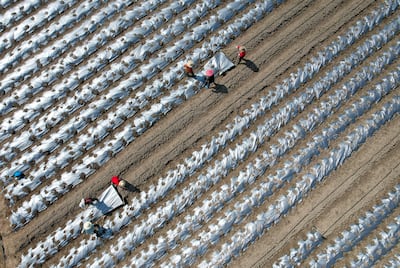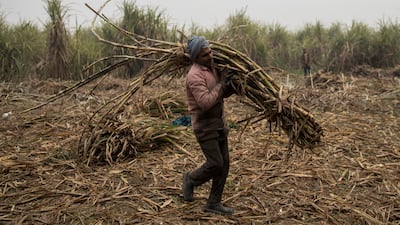Scientists have discovered a “hidden pool” of carbon in the Earth's soil that could worsen the world's climate problems if it is released.
Threats to soil health in countries such as India and China could expose 2.3 billion tonnes of stored carbon to the environment.
The “huge pool” of inorganic carbon measured by Chinese scientists is in addition to the organic kind made of decaying plants.
The soil acts as a natural store for both types of carbon, reducing the amount that is in the Earth's atmosphere.
When it escapes as CO2, it stays for hundreds of years and traps heat in the atmosphere – warming the planet.
More than 150 countries pledged to improve soil health at the Cop28 climate summit in the UAE last year.
But parts of China and India are seeing soil acidification due to industrial activities and intense farming, warns researcher Huang Yuanyuan of the Chinese Academy of Sciences.

“Acids dissolve calcium carbonate and remove it either as carbon dioxide gas or directly into the water,” said Prof Huang, who was behind the study measuring the amount of inorganic carbon.
“Here's the thing: this huge carbon pool is vulnerable to changes in the environment, especially soil acidification.
“Without remedial actions and better soil practices, the world is likely to face a disturbance of [inorganic carbon in the soil] in the next 30 years.”
The study found that 2,305 billion tonnes of inorganic carbon is stored in the top two metres of the world's soil.
This is more than five times the carbon found in all of the world's vegetation combined, the researchers said.
They said the inorganic kind was often overlooked because it is typically found in arid areas with infertile soils.
A drive to improve soil health is often bound up with a desire to protect farming and other goals such as flood prevention.
But even the loss of inorganic soil has “profound but often overlooked implications”, said the Chinese academy.
“It is now clear that inorganic carbon deserves equal attention,” it said.
It said the study “underscores the urgency” of including that kind of carbon in policies to slow global warming.
This could provide an “an additional lever for maintaining and enhancing carbon sequestration”, meaning storage in the ground, it said.


